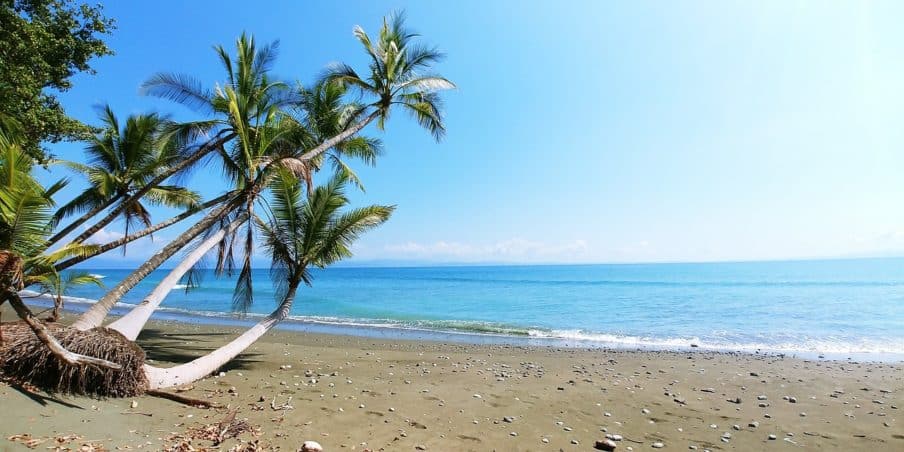
Thinking about packing up and moving to Costa Rica? You’re not alone. This Central American gem draws people with its tropical beaches, friendly locals, and a laid-back lifestyle that’s hard to beat. But relocating isn’t just about booking a flight and soaking up the sun.
To make your move smooth, you need a plan. I’ve boiled it down to eight practical steps to help you settle in, based on what you need to know before and after you arrive. Let’s get to it.
1. Research Your New Home
Before you move, dig into what life in Costa Rica is really like. This isn’t a vacation—it’s your new reality. Start by picking a region that fits your vibe. San José offers urban amenities but higher costs, while coastal spots like Tamarindo are pricier due to tourism. Rural areas like Atenas are cheaper and quieter, ideal for retirees.
Check the cost of living in your chosen area. A single person might spend $1,500-$2,000/month in a city like Escazú, including rent, food, and utilities, but you can get by on $1,000 in smaller towns. Look up local crime rates through news sites or expat forums, as petty theft can be an issue in some areas.
Learn about the healthcare system, which is top-notch for Latin America. The public system (Caja) is affordable but can have long wait times, while private hospitals like CIMA in Escazú offer faster care at a higher cost. Also, brush up on visa options and immigration laws—more on that next.
Spanish is the main language, and while English works in tourist hubs, you’ll need basic Spanish for daily life elsewhere. Finally, get a feel for the culture. Costa Ricans, or Ticos, value politeness and avoid confrontation, so expect a relaxed pace that might test your patience.
Visit Costa Rica before committing, if possible. A scouting trip lets you explore neighborhoods, meet locals, and test the lifestyle. Stay in different areas—like Nosara for beach life or Heredia for a cooler climate—to see what clicks.
Connect with expat groups on platforms like InterNations to ask about schools, internet reliability, or even how to handle rainy season floods. This hands-on research helps you avoid surprises and pick a spot that feels right.
2. Sort Out Your Visa
You can’t just show up and stay forever. Costa Rica requires a residency visa for long-term stays. Popular options include:
- Pensionado (Retiree): Prove a $1,000/month pension (e.g., Social Security).
- Rentista: Show $2,500/month income for two years or deposit $60,000 in a Costa Rican bank.
- Inversionista (Investor): Invest $150,000 in property or a business.
- Digital Nomad: Earn $3,000/month remotely, with a one-year visa renewable for another year.
Each visa has specific documents, like passports, police clearances, and financial proof, which must be translated into Spanish and notarized. Start the process early—it can take months. Hiring a local lawyer or immigration agent saves headaches, as they know the system and can handle paperwork.
Once approved, you’ll get a residency card (cedula) and must register with the Caja for healthcare. Temporary residents renew their cedula every two years, not five as some assume.
Prepare for unexpected delays by gathering documents well in advance. Birth certificates, marriage licenses, or income statements often need apostilles from your home country, which can take weeks. Check with the Costa Rican consulate for exact requirements, as rules can shift.
If you’re moving with family, each member needs their own visa application, so budget extra for fees and translations. Staying organized and patient keeps the process manageable.
3. Find a Place to Live
Housing in Costa Rica varies widely. In San José or beach towns like Jacó, expect to pay $500-$1,000/month for a one-bedroom apartment. Rural areas like Grecia offer similar places for $300-$500. Buying property is an option, but it’s a complex process—hire a lawyer to check for liens or title issues.
Start your search online through sites like the newspaper Tico Times or local real estate agencies. Short-term rentals on Airbnb can bridge the gap while you explore. Ask landlords for references to avoid scams, and ensure rental agreements are clear on terms like deposits or maintenance.
If you’re bringing pets, check housing pet policies. Costa Rica welcomes pets, but you’ll need a health certificate and vaccinations (rabies, distemper) for entry.
Factor in lifestyle when choosing a home. Coastal areas like Manuel Antonio offer ocean views but deal with humidity and higher utility costs. Inland towns like San Ramón have milder weather and lower prices but fewer amenities.
If you work remotely, prioritize reliable internet—test speeds during viewings. For families, proximity to schools or parks matters. Talk to neighbors during visits to gauge the community vibe and get insider tips on local services.
4. Register with the Government
After arriving, get your national ID card (cedula) at the Cédula y Pasaporte office. Bring your passport, two passport photos, proof of address (like a utility bill), and your visa. This ID is your key to legal residency.
Next, sign up for social security at the Instituto Nacional de Seguros (INS). You’ll need your cedula, proof of address, and birth certificate. This gives you access to the Caja healthcare system and other services. A lawyer can speed this up, as lines and paperwork can be tedious.
Keep digital and physical copies of all documents, as offices sometimes misplace paperwork. Double-check your cedula for errors in your name or birth date before leaving the office—mistakes can cause headaches later.
If you move to a new address, update your registration promptly, as your cedula ties to your listed address. Some expats recommend bringing a Spanish-speaking friend to appointments if your language skills are rusty, as not all staff speak English.
5. Set Up Utilities
Getting your utilities connected is straightforward but requires some legwork. For electricity, contact the Instituto Costarricense de Electricidad (ICE) with your cedula and proof of address. Water services come from local municipalities—notify them of your move for a meter reading.
Internet and phone providers like Kolbi or Claro often require a deposit and proof of residency. Expect to pay $30-$60/month for decent internet. Cable TV from Tigo or Movistar costs about the same. Garbage collection is handled by municipalities; check local schedules.
Ask your landlord or neighbors for provider recommendations, as service quality varies by region. Plan for occasional service disruptions, especially in rural areas during heavy rains. Stock up on backup options like portable Wi-Fi hotspots if you rely on internet for work.
When setting up accounts, clarify billing details—some providers send paper bills, while others require online payments through local banks. If you’re renting, confirm which utilities are included to avoid surprise costs. Joining local WhatsApp groups can alert you to outages or maintenance schedules.
6. Get Healthcare Sorted
Costa Rica’s healthcare is a highlight. The public Caja system covers everything from check-ups to surgeries for a monthly fee (around $50-$150, based on income). Register at a CCSS office with your cedula and proof of address. Be ready for wait times, especially for non-emergency care.
Private hospitals like Clínica Bíblica in San José offer faster service and English-speaking doctors. Plans cost $100-$300/month, depending on coverage. Compare providers to find one that fits your budget and needs.
Ask about specific services before choosing a provider. For example, the Caja covers dental care, but complex procedures might require private clinics. If you have chronic conditions, confirm medication availability—some drugs aren’t stocked locally and need importing.
Private insurance often includes telehealth options, handy for minor issues. Expats suggest keeping a small emergency fund for unexpected medical costs, as even private care can add up without full coverage.
7. Learn Spanish
Spanish is essential for daily life outside tourist areas. Enroll in a language school—many in San José or Heredia offer intensive courses for $200-$500/month. Online platforms like Duolingo or italki are flexible alternatives.
Immerse yourself by chatting with locals at markets or cafes. Watching Tico shows or reading local news also helps. Learning Spanish opens doors to friendships, jobs, and a deeper connection to the culture.
To boost your skills, join cultural activities that double as language practice. Many language schools, like Tico Lingo in Heredia, offer cooking classes where you learn to make empanadas while practicing vocabulary, or dance lessons to pick up salsa moves and slang.
Homestays with local families are another game-changer—you’ll use Spanish daily over meals or casual chats, picking up Tico phrases like “Pura Vida” in context. Schools often organize “intercambios,” where you meet locals to practice conversation, helping you gain confidence and make friends. These experiences make learning feel less like a chore and more like living the culture.
8. Build a Social Network
Costa Rica’s expat community is welcoming, and locals are friendly. Join groups like the American Association of Retirees or Facebook groups for expats in your area. Attend local festivals, farmers’ markets, or sports events to meet people.
Making friends takes time, so be patient. Say yes to invitations, volunteer, or join a gym to connect with others. These bonds will make Costa Rica feel like home.
Explore hobbies to expand your circle. Sign up for surf lessons in Playa Dominical, join a birdwatching group in Monteverde, or take art classes in Santa Ana—shared interests spark connections. Local “ferias” (farmers’ markets) are great for casual chats with vendors, who often love sharing stories. If you’re religious, attending a local church or temple can introduce you to tight-knit communities. Building these ties helps you feel rooted and gives you a support network for life’s ups and downs.
Cost of Living Snapshot
Here’s a breakdown of typical monthly expenses for a single person in Costa Rica (2025 estimates):
| Category | Urban (San José) | Rural (Atenas) |
|---|---|---|
| Rent (1-bedroom) | $500-$1,000 | $300-$500 |
| Utilities | $100-$200 | $80-$150 |
| Groceries | $300-$400 | $250-$350 |
| Healthcare (Caja) | $50-$150 | $50-$150 |
| Internet/Phone | $30-$60 | $30-$60 |
| Total | $1,380-$2,110 | $910-$1,460 |
Source: Adapted from web research. Costs vary by lifestyle.
Final Thoughts
Moving to Costa Rica is a big step, but it’s one that can change your life in the best way possible. The country’s relaxed pace, natural beauty, and warm community make it a place where you can hit reset and build something new. That said, it’s not without challenges. The slower bureaucracy, language barriers, and adjusting to a different cultural rhythm can test your patience, especially in the first few months. But with preparation and the steps outlined above, you’ll be ready to tackle them.
Think of your move as a long-term investment in your happiness. Budget carefully—factor in one-time costs like shipping your belongings ($350-$20,000, depending on what you bring) or legal fees for visas and property ($500-$2,000). If you’ve got kids, explore schooling options early. Public schools are free and immerse kids in Spanish, but private or international schools ($200-$1,000/month) might be better if you want English-based education or a smoother transition.
Embrace the Tico way of life. The phrase “Pura Vida” isn’t just a slogan—it’s a mindset of gratitude and simplicity. You’ll notice it in how locals greet you at the market or take time to chat despite busy days. Lean into that. Join a local yoga class, volunteer at a turtle conservation project, or grab a coffee with your neighbor. These small moments build a sense of belonging.
Don’t rush the process. Settling in takes time, and that’s okay. You might feel like an outsider at first, but every expat does. Keep showing up, keep learning, and soon enough, you’ll find your rhythm. And if you hit a snag—say, a delayed visa or a tricky landlord—reach out to expat forums or professionals for advice.
Moving to Costa Rica is a bold choice, and you’re already on the right track. Here’s to your new adventure—Pura Vida!

